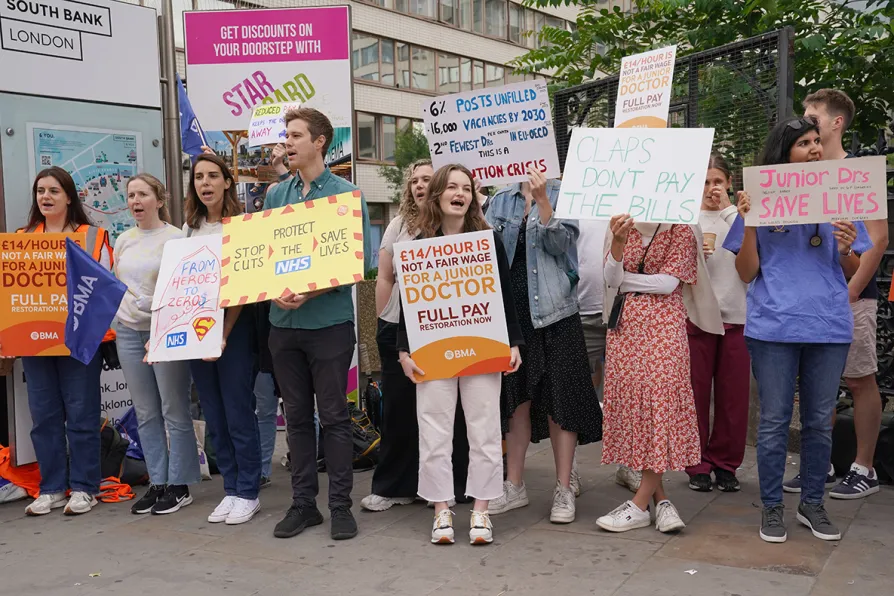
 Junior doctor members of the British Medical Association (BMA) on the picket line outside St Thomas' Hospital, London, July 13, 2023
Junior doctor members of the British Medical Association (BMA) on the picket line outside St Thomas' Hospital, London, July 13, 2023
RISHI SUNAK’S bid to blame strikes for Britain’s yawning NHS waiting lists will hardly appease health workers taking action to secure the service’s future.
The Prime Minister had no answer to the Scottish National Party’s Philippa Whitford, who pointed out that by engaging with health unions on restoring years of lost pay the Scottish government has avoided the strikes which have swept England.
Prime Minister’s Questions was sandwiched between the longest junior doctors’ strike in history, which ended on Tuesday, and the first strike by consultants in 50 years — which begins on Thursday.
The NHS workforce plan Sunak boasts about has nothing to offer these doctors, or for that matter the rest of the NHS workforce.
While pledging increased numbers of training places, it says nothing about pay to retain existing staff who continue to leave in huge numbers — nothing even to address the range of galling irritations that can make life a misery for health workers, from paying to park at their own workplaces to a lack of hot meals on night shifts.
It makes no commitment on restorative funding for the NHS either, though underinvestment since the Conservative-Liberal Democrat coalition took office in 2010 is fundamental to the NHS’s problems. Waiting lists had already doubled on 2010 figures by the time Covid hit in 2020.
The staffing crisis cannot be addressed without higher pay. Sunak tries to make a virtue of listening to the “independent” pay review bodies, but health workers can see through this.
For one thing these bodies are not independent, but government-appointed; for another it took a wave of strikes before ministers would even agree to their recommendations.
For all the PM tries to guilt-trip workers, the lesson of 2023 is that strikes deliver.
While settlements may have been reached with most NHS workers on Agenda for Change pay grades, these only last until next year — and with inflation still soaring, health unions will be looking at how to build on this year’s qualified advance. If money for the pay awards conceded this month comes from cutting services — and aside from a nasty and punitive hike to immigration fees, the funding remains unclear — this itself could provoke “a new wave of strikes in the NHS,” as Unite leader Sharon Graham has warned.
The health service is deep in crisis, with no end in sight. This is unfortunately only underlined by the one line from Sunak that hit home: his demand that Keir Starmer “unglue himself from the fence” on public-sector pay.
Starmer’s jibe that the Tories have stolen Labour’s workforce plan will fall flat with NHS workers well aware that the plan ignores all their concerns, from pay to privatisation.
And Sunak’s quip that Labour wants to charge people £12.50 to see a GP — a reference to the expansion of the ultra-low emissions zone (Ulez) in London by Labour Mayor Sadiq Khan — carries the grim reminder that neither party can be relied on to protect an NHS free at the point of use, either. Sajid Javid, the Tory former health secretary and chancellor, has spent the summer praising Wes Streeting’s plans for the NHS; he was on record as recently as January calling for the introduction of charges for GP appointments.
Tomorrow the Tories face three difficult by-elections in what the party would usually see as safe seats. If they lose, it will rightly be seen as proof of the depth of public anger at crippled services, the rocketing cost of living and a sleazy political elite only in it for themselves.
The tragedy is that there is no evidence their defeat will change any of that. It was the labour movement, not the Labour Party, which shifted ministers on pay. It will be up to the labour movement too to shatter the poisonous cross-party consensus on our NHS.














